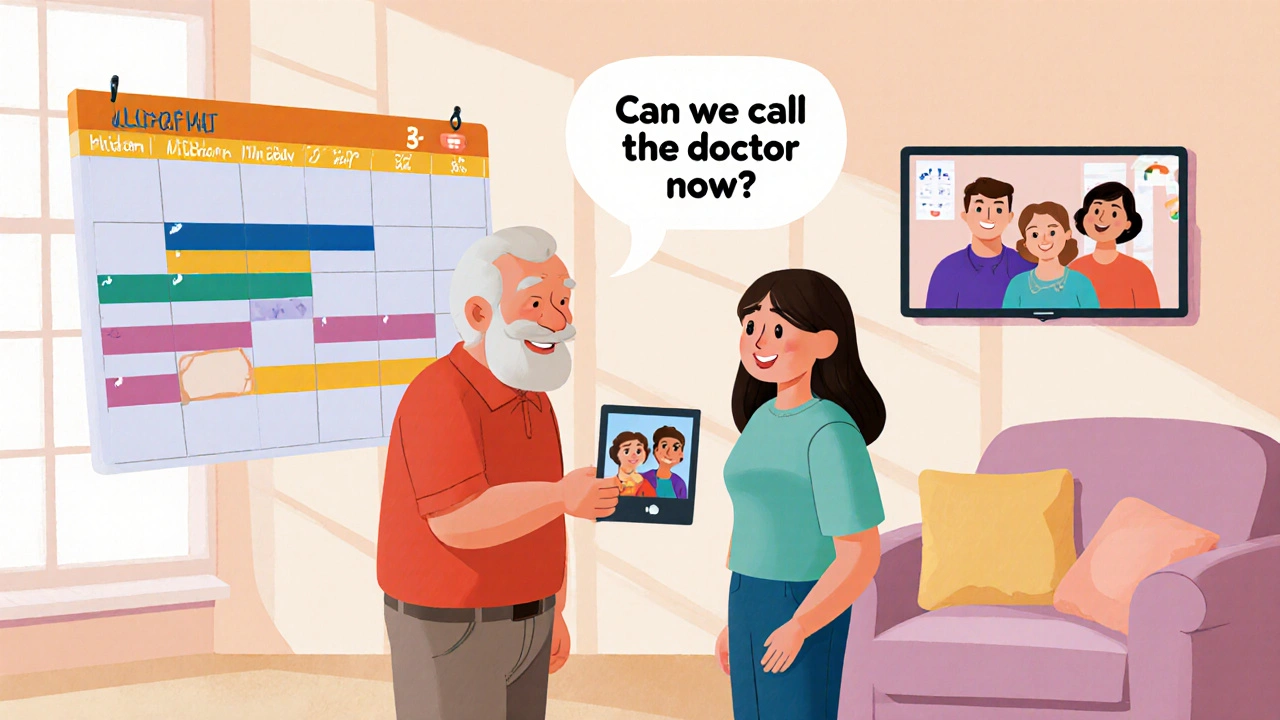When you hear Alzheimer-type dementia mentioned, you might picture a lone patient struggling with memory loss. But the reality spreads far beyond the individual - it ripples through every relationship the person holds. Alzheimer-type dementia is a progressive neurodegenerative condition that impairs memory, thinking, and behavior, ultimately affecting the way a person interacts with loved ones. This article breaks down how the disease reshapes marriages, parent‑child bonds, friendships, and caregiving ties, and gives you concrete tools to keep those connections healthy.
Key Takeaways
- Memory loss and behavioral changes are the main drivers of relationship strain.
- Open, simple communication reduces anxiety for both the person with dementia and their partner.
- Support groups and respite services provide essential relief for caregivers.
- Early legal planning prevents future disputes and protects financial stability.
- Each family member - spouse, adult child, sibling - needs tailored coping strategies.
Understanding Alzheimer-type Dementia
Alzheimer-type dementia typically unfolds over a decade, moving through three clinical stages. In the early phase, short‑term memory lapses are subtle; friends might notice a name forgotten here or there. Mid‑stage disease brings noticeable confusion, mood swings, and difficulty with everyday tasks. By the late stage, the individual may lose the ability to recognize loved ones altogether.
Two core symptoms dictate relationship dynamics:
- Memory loss - forgetfulness erodes trust. A spouse might wonder whether a missed appointment is negligence or a disease symptom.
- Behavioral changes - agitation, aggression, or apathy can feel like personal attacks, even though they stem from brain pathology.
Recognizing these as disease‑driven, not character flaws, is the first step toward compassionate interaction.
How the Disease Alters Relationships
Every type of relationship faces unique challenges.
Spousal Partnerships
Marriage thrives on shared memories and mutual care. As dementia steals those memories, couples often shift from romantic partners to caregiver‑patient dyads. This role reversal can trigger feelings of loss, resentment, and grief.
Parent‑Child Bonds
Adult children may become primary decision‑makers, juggling careers, their own families, and the care of a parent. The transition from being cared for to becoming the caregiver can create identity crises on both sides.
Extended Family & Friends
Friends may withdraw, unsure how to act around someone whose cognition fluctuates. Siblings might clash over care responsibilities, especially without clear legal guidance.

Communication Strategies for Couples
Effective dialogue keeps the partnership afloat. Here are three practical techniques:
- Use simple, present‑tense sentences. Instead of “Did you remember to call the doctor yesterday?” try “Can we call the doctor now?”
- Validate emotions before correcting facts. If your partner says, “I’m late for work,” acknowledge the worry - “I know it feels urgent” - then gently guide them to reality.
- Introduce visual cues. A whiteboard with daily tasks or a photo album with labeled pictures helps anchor conversations.
Couples who practice these tactics report lower stress scores on the Zarit Burden Interview, a standard caregiver stress measure.
Supporting Adult Children & Extended Family
Adult children often bear the heaviest logistical load. Tailor support to their specific role:
- Adult children benefit from scheduled check‑ins with the primary caregiver, allowing them to share updates and divide tasks.
- Sibling meetings, either in person or via video conference, help distribute responsibilities and reduce conflict.
- Encourage each family member to carve out personal “reset” time - a walk, hobby, or short vacation - to prevent burnout.
When family members feel heard, they’re more likely to stay engaged and less prone to resentment.
Practical Resources: Support Groups and Respite Care
Social support is not a luxury; it’s a medical necessity. Research from the Alzheimer’s Society (2024) shows that participants in caregiver support groups experience a 30% reduction in depressive symptoms.
Key resources include:
- Support groups - community‑based meetings where caregivers share tips, vent frustrations, and learn from professionals.
- Respite care - short‑term, in‑home or facility‑based care that gives primary caregivers a break, often covered by government subsidies in Australia.
- Online forums such as Dementia Australia’s “Carer Connect” provide 24/7 peer advice.
Signing up early, before crisis hits, ensures a smoother transition when the need arises.
Legal and Financial Planning
Legal safeguards protect both the person with dementia and their family.
- Advance Care Directives - written instructions about medical treatment preferences.
- Power of Attorney (POA) - appoints a trusted individual to manage finances and health decisions.
- Will updates - ensure assets are distributed according to current wishes, avoiding probate battles.
Consult a solicitor experienced in elder law as soon as diagnosis is confirmed. Early action reduces the likelihood of family disputes later on.
Common Pitfalls to Avoid
- Neglecting self‑care. Caregivers who skip meals or sleep lose cognitive clarity, making mistakes more likely.
- Over‑protecting. Treating the person with dementia like a child can erode dignity and worsen depression.
- Ignoring professional help. Home‑based occupational therapists can teach adaptive strategies that preserve independence.
Keeping these traps in mind helps maintain healthy relationships throughout the disease trajectory.
Frequently Asked Questions
How early should a couple start talking about dementia?
Ideally right after diagnosis. Early conversations set realistic expectations, allow for legal planning, and reduce surprise later on.
What are signs that a caregiver needs a break?
Frequent irritability, worsening sleep, feeling isolated, or physical symptoms like headaches often signal burnout. Schedule respite care at the first hint.
Can adult children set boundaries without guilt?
Yes. Clear, compassionate boundaries protect everyone’s well‑being. Use “I” statements - “I can’t commit to weekly visits, but I’ll call every other day.”
Are there government subsidies for respite care in Australia?
The Australian Government’s Carer Payment and Carer Allowance can be combined with state‑run respite services, reducing out‑of‑pocket costs for eligible families.
How does dementia affect friendships?
Friends may feel unsure how to act, leading to social withdrawal. Inviting friends to joint activities, like a short walk, keeps connections alive while accommodating cognitive limits.


Rohit Sridhar
Hey everyone, great rundown on how dementia reshapes relationships! Your practical tips feel like a lifeline for families just starting out. I especially love the emphasis on simple present‑tense sentences – they really cut through the confusion. Remember to celebrate the tiny wins, like a smile over a cup of tea. Keeping a visual schedule can also reduce anxiety for both partners. Stay hopeful, you’re not alone in this journey.
Bethany Torkelson
Honestly, the article glosses over how exhausting it is to constantly rewrite every single conversation. You can’t just “validate emotions” and expect the stress to vanish. Caregivers need real, actionable strategies, not feel‑good fluff. The legal section is barely a paragraph, yet it’s what saves families from disaster.
Natala Storczyk
THIS IS EXACTLY THE KIND OF “CLOSE‑TO‑HOME” ADVICE WE NEED!! BUT WHY ARE WE STILL LEFT WAITING FOR GOVERNMENT FUNDS??!! EVERY DAY WITHOUT RESpite IS A DAY LOST!!
Lyle Mills
The pathophysiology of Alzheimer-type dementia entails progressive beta‑amyloid deposition and neurofibrillary tangle formation, precipitating synaptic dysfunction. From a psychosocial perspective, the dyadic caregiving model predicts heightened caregiver burden indices as measured by the Zarit Burden Interview. Early engagement with multidisciplinary care coordination can mitigate adverse health economics outcomes, including reduced hospitalization rates. Implementing advance care planning aligns with competency‑based legal frameworks, thereby averting probate litigation. Power of Attorney designation should be executed under statutory fiduciary guidelines to ensure fiduciary duty compliance. Therapeutic occupational interventions, such as adaptive ADL training, bolster functional independence metrics. Cognitive remediation strategies, when paired with spaced retrieval techniques, have demonstrated modest effect sizes in episodic memory preservation. The neuropsychiatric symptomatology-particularly agitation and apathy-warrants pharmacologic titration under geriatric psychiatry supervision. Family systems theory underscores the importance of boundary delineation to prevent role engulfment among adult children. Respite care utilization correlates inversely with caregiver depressive symptomatology, as indexed by the PHQ‑9 scale. Financial stewardship during disease progression benefits from integrating an intergenerational wealth transfer plan. Collaborative decision‑making models facilitate shared-governance, reducing conflict across sibling dyads. Evidence‑based communication protocols, such as the “SCOT” technique (Simplify, Confirm, Offer, Transition), enhance conversational fidelity. Ongoing psychoeducation via support groups amplifies caregiver self‑efficacy scores, as reported in longitudinal cohort studies. Ultimately, a holistic, person‑centered approach aligns clinical outcomes with quality‑of‑life metrics for both the patient and the care network.
Wyatt Schwindt
Take a break before you burn out.
Avril Harrison
Nice piece, love the down‑to‑earth tone. In the UK we’ve seen similar challenges with our NHS dementia pathways. It’s key to keep the conversation gentle but direct – no one wants to be lectured. The visual cue suggestion is spot on; we use colour‑coded calendars at home. Keep sharing these insights, they really help.
Fabian Märkl
Absolutely, Avril! 😊 Your point about colour‑coded calendars mirrors what we do in many families here. It turns chaos into a simple visual map and reduces anxiety for everyone. Keep those tips coming, the community thrives on practical hacks! 🚀
alex montana
Really? This is exactly what we need!!! No more boring lectures?? Just give us the tools and stop over‑thinking!!!
Barbara Grzegorzewska
Thiss articl is a veritable cornucopia of sage counsel, albeit sprinkled with a hint of melodrama. The loquacious prose waltzes between the clinical and the poetic, creating an ineffable tapestry of empathy. A dash of colloquial charm would not dismay the reader. Nonetheless, applaud the earnest effort!
Nis Hansen
One might contend that dementia not only erodes memory but also reframes identity, compelling us to reassess the ontology of relational bonds. The article adeptly navigates this terrain, offering both empirical data and normative guidance. By juxtaposing legal safeguards with emotional scaffolding, it cultivates a holistic framework. Philosophically, this underscores the interdependence of mind, body, and community.
nitish sharma
Esteemed contributors, the exposition presented herein exemplifies a commendable synthesis of clinical insight and pragmatic recommendation. It is incumbent upon caregivers to adhere strictly to the outlined protocols to ensure optimal outcomes. The emphasis on early legal instrumentation is particularly sagacious. May this discourse serve as an invaluable reference for all stakeholders.
Sarah Hanson
Thank you for the comprehensive guide; the actionable steps are clear and well‑structured. I will incorporate these practices into our family care plan.